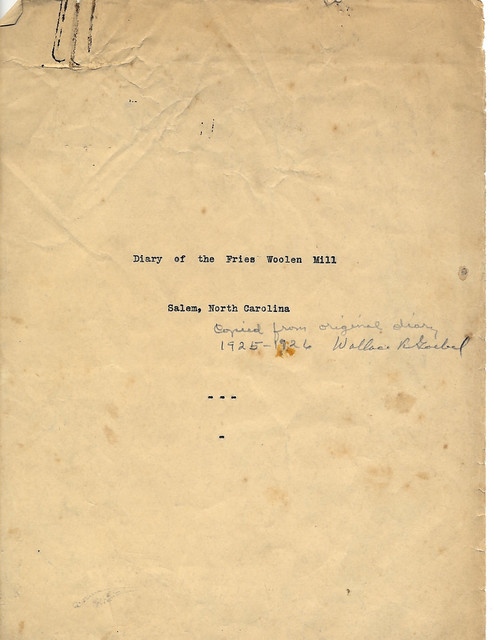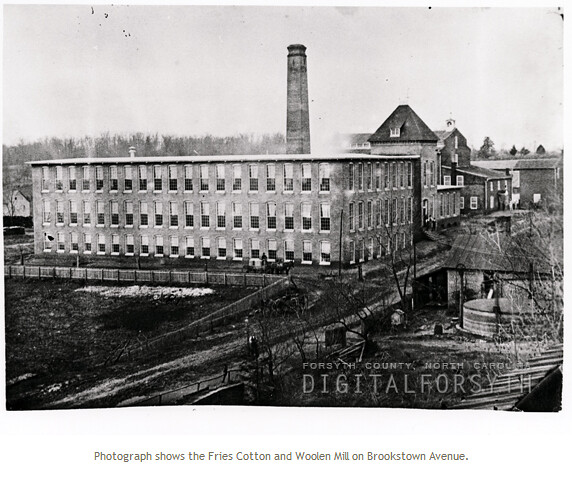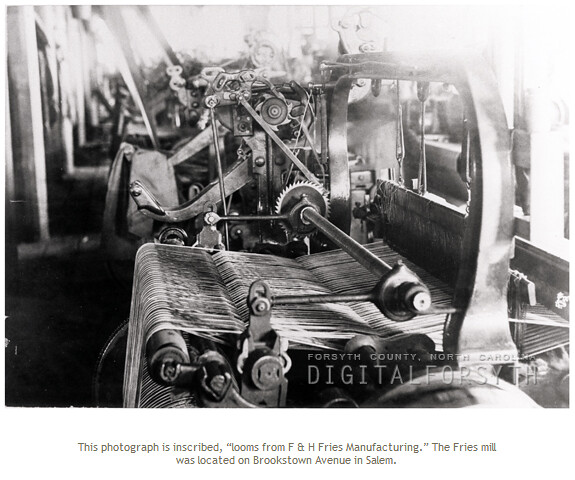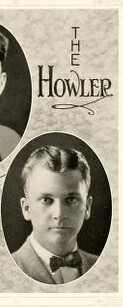This article is more than 5 years old.
The Fries Woolen Mill Diary is story within a story. Two men are responsible for this one folder “collection” being a part of the WFU archives, Francis Levin Fries and Wallace Barger Goebel. Separated by almost one hundred years, Fries was instrumental in the creation of the original diary and Goebel is responsible for the copy within our collection. The diary is a wealth of information about Salem as a mill and textile town.
http://www.digitalforsyth.org/photos/7492
[The following is transcribed from what we believe is Goebel’s narrative and research on Fries and the diary]
Francis Levin Fries was born October 17, 1812, in Salem, NC. He was the eldest child of John Christian William Fries and Johanna Elizabeth, maiden name Nissen. He was educated in the boys’ school of Salem, and then at Nazareth Hall, in Nazareth, PA. In 1836 the Salem Cotton Manufacturing Company was organized in Salem, and Mr. Fries was employed as its Agent. Though without and previous experience whatever, he went North, studied cotton mill machinery, bought what was needed, shipped it to Salem, installed it, and ran the mill for nearly four years.
In the fall of 1839 Francis Fries began to make plans for a small wool-mill, to be conducted on his own account. Fortunately for the historian, it was then still the rule in Salme that the new enterprises must have the approval of the Aufseher Cellegium, and therefore the Minutes of that Board, furnish interesting information concerning the preliminaries. On Oct. 25, 1839, the Minutes of the Collegium recorded that Francis Fries and his father, William Fries, were planning to build a small woolen mill on a lot back of William Fries’s home-place, that is on the west side of what is now South Liberty (then Salt) street. Members of the Collegium were favorably inclined, but a few days later the neighbors entered a protest, basing it on their fear of the smoke from the steam-engine, and because he planned to use slave labor in the mill. On Nov. 21st the Collegium had a conference with Mr. Fries, in which these objections were freely discussed. Fries agreed to build his factory on an out-lot at the corner of the new Shallowford Street and Salt Street, thereby removing the smoke from the center of town. There was a rule in Salem dating from the action of the Congregation Council in February, 1820, that no slave might be taught a “trade or profession” that is a handicraft of any kind, no matter whether the slave belonged to the ma teaching him or was hired from another. This applied only to the residents in the town of Salem, and from the wording of the resolution was evidently intended to prevent competition with the white artisans of the community. In the conference with Fries in 1839, the Collegium concluded that it would not be teaching a slave a trade to let him run a machine, and therefore would not establish a dangerous precedent. It was noted that Fries did not expect to establish a large factory, because not a great deal of suitable wool was raised in the State, so not many slaves would be employed there, and he promised to give bond that if the slaves made trouble, he would send them away, and if in the course of years the factory became a nuisance he would give it up. The Collegium met again on the following day and decided that as the weaving would be done on William Fries’ farm, outside the town, the men running the machines would rate a “day laborers”, and so no precedent would be established.
The lease system still prevailed in Salem, and on Feb. 3, 1840, a Lease was signed, giving Fries possession of a lot on the north-west corner of what are now Brookstown Avenue and South Liberty Street. As the factory developed this lot proved to be too small, and adjacent land was added several times.
From the beginning Mr. Fries was assisted in the wool mill by his younger brother Henry w. Fries, who became a partner in the business in March, 1846. Among the papers of the firm of F. & H. Fries there is a small mill diary, beginning abruptly on April 13, 1840 and setting forth the details of what was virtually a pioneer enterprise. It presents a vivid picture of the industry, tireless energy, and versatility of the owner; and of his treatment of his slaves, his “boys”, of whom he expected readiness to follow his lead in work, but for who he would close the mill when the weather was right for a rabbit hunt, or when a circus was in town.
During the Civil War the Fries Mill was run for the government, making the “Confederate Gray” cloth used for the soldiers. When the war opened, Mr. Fries was in poor health, and died in August, 1863. His brother ran the mill until the sons of Mr. Fries grew to maturity, the name continued unchanged. Henry W. Fries never married, and remained head of the firm until his death in November, 1902, at the age of seventy seven.
After the Civil War, Henry W. Fries helped a number of the slaves formerly belonging to the family to buy homes of their own. Some remained in the employ of the firm, or individual members thereof, until death, although in the wool mill they were largely replaced by white labor.
The original Fries Woolen Mill Diary is part of the Francis Levin Fries Papers, 1850-1925 held in the Wilson Library at the University of North Carolina at Chapel Hill. Wallace Barger Goebel graduated from Wake Forest in 1925 and published A History of Manufactures in North Carolina Before 1860 in 1926, the same years handwritten on the title page of his transcribed diary. It can be deduced that the transcription and accompanying summarized biographical and historical note at the beginning of WFU’s copy of the diary was part of Goebel’s book research.
Described as the “Lady’s Man” in the Howler’s Prophecy for the Class of 1925, Goebel became an author, a professor of history and political science, and an archivist at the U.S. National Archives and Records Service. Although Goebel’s papers were acquired by the Archives in 1988, it is believed that the Fries Woolen Mill Diary (MS39) has been in the collection since the late 1920’s. Goebel has made a lasting impression on Wake Forest. He not only provided the Archives with this account of Winston-Salem history and his own personal papers, he also has a scholarship fund established in his name here at Wake Forest. The Wallace Barger Goebel Scholarship is based on ability and need, with first preference to a student interested in literature, second preference to a student interested in history, and third preference to a student enrolled in the premedical program.





3 Comments on ‘Featured Collection: Fries Woolen Mill Diary (MS39)’
This is a great way to pull together all the elements in a collection- even a small collection like this. This helps you understand all the connections. Great writing and use of the archives from the papers of an archivist! I think closing for a rabbit hunt or a circus is a good idea.
A really interesting read. I enjoyed seeing images that illustrated what you were conveying. Nice story!
Thanks for highlighting this. It’s a great bit of local history. Really interesting to read about the controversies surrounding the establishment of the mill.